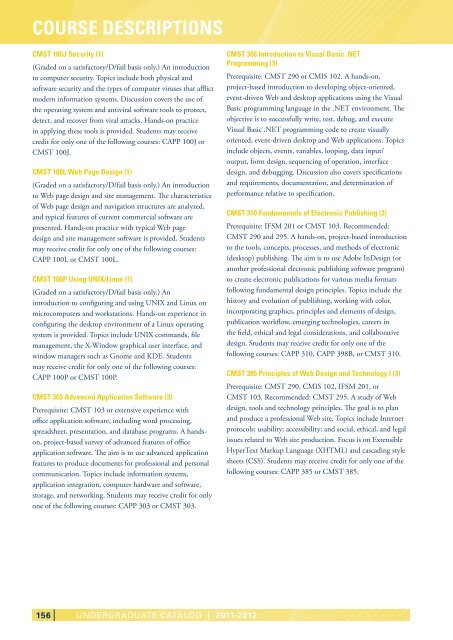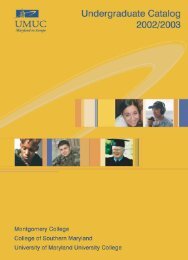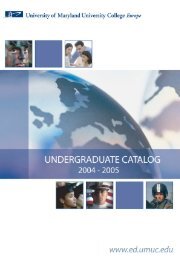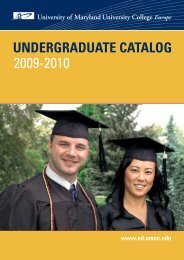Undergraduate Catalog - UMUC Europe
Undergraduate Catalog - UMUC Europe
Undergraduate Catalog - UMUC Europe
You also want an ePaper? Increase the reach of your titles
YUMPU automatically turns print PDFs into web optimized ePapers that Google loves.
COURSE DESCRIPTIONS<br />
CMST 100J Security (1)<br />
(Graded on a satisfactory/D/fail basis only.) An introduction<br />
to computer security. Topics include both physical and<br />
software security and the types of computer viruses that afflict<br />
modern information systems. Discussion covers the use of<br />
the operating system and antiviral software tools to protect,<br />
detect, and recover from viral attacks. Hands-on practice<br />
in applying these tools is provided. Students may receive<br />
credit for only one of the following courses: CAPP 100J or<br />
CMST 100J.<br />
CMST 100L Web Page Design (1)<br />
(Graded on a satisfactory/D/fail basis only.) An introduction<br />
to Web page design and site management. The characteristics<br />
of Web page design and navigation structures are analyzed,<br />
and typical features of current commercial software are<br />
presented. Hands-on practice with typical Web page<br />
design and site management software is provided. Students<br />
may receive credit for only one of the following courses:<br />
CAPP 100L or CMST 100L.<br />
CMST 100P Using UNIX/Linux (1)<br />
(Graded on a satisfactory/D/fail basis only.) An<br />
introduction to configuring and using UNIX and Linux on<br />
microcomputers and workstations. Hands-on experience in<br />
configuring the desktop environment of a Linux operating<br />
system is provided. Topics include UNIX commands, file<br />
management, the X-Window graphical user interface, and<br />
window managers such as Gnome and KDE. Students<br />
may receive credit for only one of the following courses:<br />
CAPP 100P or CMST 100P.<br />
CMST 303 Advanced Application Software (3)<br />
Prerequisite: CMST 103 or extensive experience with<br />
office application software, including word processing,<br />
spreadsheet, presentation, and database programs. A handson,<br />
project-based survey of advanced features of office<br />
application software. The aim is to use advanced application<br />
features to produce documents for professional and personal<br />
communication. Topics include information systems,<br />
application integration, computer hardware and software,<br />
storage, and networking. Students may receive credit for only<br />
one of the following courses: CAPP 303 or CMST 303.<br />
156<br />
UNDERGRADUATE CATALOG | 2011-2012<br />
CMST 306 Introduction to Visual Basic .NET<br />
Programming (3)<br />
Prerequisite: CMST 290 or CMIS 102. A hands-on,<br />
project-based introduction to developing object-oriented,<br />
event-driven Web and desktop applications using the Visual<br />
Basic programming language in the .NET environment. The<br />
objective is to successfully write, test, debug, and execute<br />
Visual Basic .NET programming code to create visually<br />
oriented, event-driven desktop and Web applications. Topics<br />
include objects, events, variables, looping, data input/<br />
output, form design, sequencing of operation, interface<br />
design, and debugging. Discussion also covers specifications<br />
and requirements, documentation, and determination of<br />
performance relative to specification.<br />
CMST 310 Fundamentals of Electronic Publishing (3)<br />
Prerequisite: IFSM 201 or CMST 103. Recommended:<br />
CMST 290 and 295. A hands-on, project-based introduction<br />
to the tools, concepts, processes, and methods of electronic<br />
(desktop) publishing. The aim is to use Adobe InDesign (or<br />
another professional electronic publishing software program)<br />
to create electronic publications for various media formats<br />
following fundamental design principles. Topics include the<br />
history and evolution of publishing, working with color,<br />
incorporating graphics, principles and elements of design,<br />
publication workflow, emerging technologies, careers in<br />
the field, ethical and legal considerations, and collaborative<br />
design. Students may receive credit for only one of the<br />
following courses: CAPP 310, CAPP 398B, or CMST 310.<br />
CMST 385 Principles of Web Design and Technology I (3)<br />
Prerequisite: CMST 290, CMIS 102, IFSM 201, or<br />
CMST 103. Recommended: CMST 295. A study of Web<br />
design, tools and technology principles. The goal is to plan<br />
and produce a professional Web site. Topics include Internet<br />
protocols; usability; accessibility; and social, ethical, and legal<br />
issues related to Web site production. Focus is on Extensible<br />
HyperText Markup Language (XHTML) and cascading style<br />
sheets (CSS). Students may receive credit for only one of the<br />
following courses: CAPP 385 or CMST 385.






